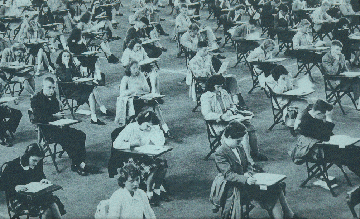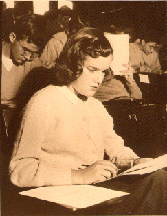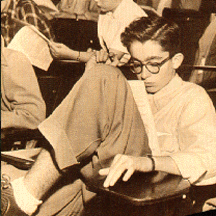 The University of Chicago Magazine June 1995
The University of Chicago Magazine June 1995

THE GENERAL CONCEPT sounds lifted from one of those late-night cable TV ads. "Imagine it," a breathless, moonfaced Sally Struthers announces. "You can receive your college degree simply by taking 14 comprehensive exams on a variety of topics. And you never even have to step into a classroom...."
But this isn't some cheesy correspondence school we're talking about. Rather, it's the U of C's famed Hutchins College, that bastion of Great Books and Better Minds. Surely there was some more subtle method of judging educational attainment than by multiple choice?
In fact, comprehensive exams (aka "comps") were key to the character of the Hutchins College -- even though they were suggested two years before young Robert Maynard set foot on campus. It was in 1928, under President Max Mason, that a faculty committee first proposed the exams as part of a larger plan to "place upon the shoulders of all students a larger measure of responsibility for their own educational progress."
In the comp system, entering students first took placement exams in several general areas: Lower scores placed a student at "first-year" level, and so on. After placements came comprehensives. Presumably, classes filled the gaps in between, but weren't required. Indeed, the system was so shockingly anti-in loco parentis that it caused a national stir, with photogs elbowing into the Field House each spring to record the spectacle of student test-takers.
Often lost in the hoopla was notice of the system's many virtues. Because grades were assigned on an impersonal basis, no one could curry professorial favor in hopes of a better grade -- or be penalized for disagreeing. The system also required that teachers collectively, consistently, and coherently define the skills and knowledge students were supposed to acquire from each course.
Downsides? Although it was difficult to excel in the tests, a passing grade came fairly easily by using a few well-known rules of thumb, such as eliminating answers with "always" and "never." And the exams minimized the role of writing, a skill many would argue is essential to a liberal-arts education. These and other reasons were cited when the comp system was dismantled after Hutchins' 1951 departure.
It may be premature to call the system extinct, however. As public demand for less subjective verification of student progress grows, the College comps may hold renewed appeal. Sally Struthers, are you listening?


